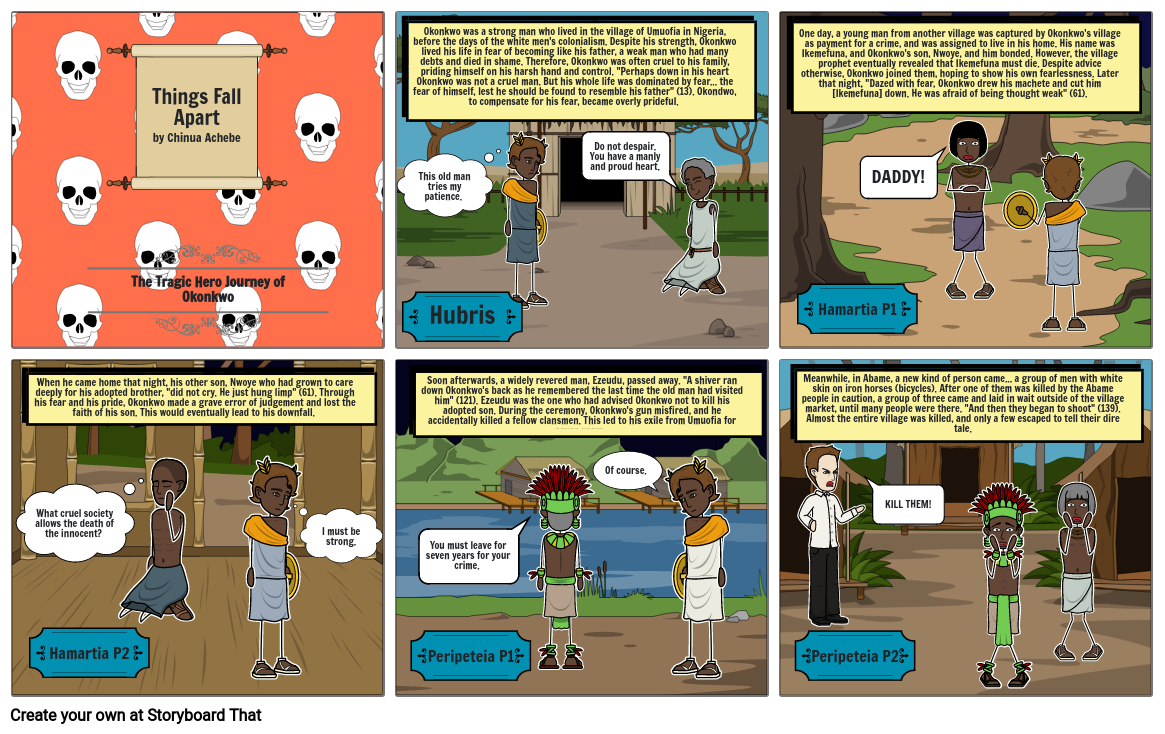Things Fall Apart: The Tragic Hero Journey of Okonkwo

Tekst Storyboardowy
- The Tragic Hero Journey of Okonkwo
- Things Fall Apartby Chinua Achebe
- This old man tries my patience.
- Okonkwo was a strong man who lived in the village of Umuofia in Nigeria, before the days of the white men's colonialism. Despite his strength, Okonkwo lived his life in fear of becoming like his father, a weak man who had many debts and died in shame. Therefore, Okonkwo was often cruel to his family, priding himself on his harsh hand and control. "Perhaps down in his heart Okonkwo was not a cruel man. But his whole life was dominated by fear... the fear of himself, lest he should be found to resemble his father" (13). Okondwo, to compensate for his fear, became overly prideful.
- Hubris
- Do not despair. You have a manly and proud heart.
- One day, a young man from another village was captured by Okonkwo's village as payment for a crime, and was assigned to live in his home. His name was Ikemefuna, and Okonkwo's son, Nwoye, and him bonded. However, the village prophet eventually revealed that Ikemefuna must die. Despite advice otherwise, Okonkwo joined them, hoping to show his own fearlessness. Later that night, "Dazed with fear, Okonkwo drew his machete and cut him [Ikemefuna] down. He was afraid of being thought weak" (61).
- Hamartia P1
- DADDY!
- What cruel society allows the death of the innocent?
- When he came home that night, his other son, Nwoye who had grown to care deeply for his adopted brother, "did not cry. He just hung limp" (61). Through his fear and his pride, Okonkwo made a grave error of judgement and lost the faith of his son. This would eventually lead to his downfall.
- Hamartia P2
- I must be strong.
- Soon afterwards, a widely revered man, Ezeudu, passed away. "A shiver ran down Okonkwo's back as he remembered the last time the old man had visited him" (121). Ezeudu was the one who had advised Okonkwo not to kill his adopted son. During the ceremony, Okonkwo's gun misfired, and he accidentally killed a fellow clansmen. This led to his exile from Umuofia for seven years.
- Peripeteia P1
- You must leave for seven years for your crime.
- Of course.
- Meanwhile, in Abame, a new kind of person came... a group of men with white skin on iron horses (bicycles). After one of them was killed by the Abame people in caution, a group of three came and laid in wait outside of the village market, until many people were there. "And then they began to shoot" (139). Almost the entire village was killed, and only a few escaped to tell their dire tale.
- Peripeteia P2
- KILL THEM!
Utworzono ponad 30 milionów scenorysów

